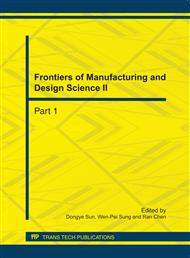p.4747
p.4753
p.4758
p.4764
p.4770
p.4779
p.4784
p.4788
p.4796
Study on Sensorless Control Model Based on a Model Reference Adaptive System with Parameter Optimization
Abstract:
A sensorless control model based on a model reference adaptive system (MRAS) with the theory of parameter optimization for the Permanent Magnet Synchronous Motors (PMSM) servo system is presented in this paper. The model can promptly work out the speed of the rotor without any other position/speed sensor. Different from the other MRAS-based speed observers which constructed according the theory of stability customarily, by using the error between the measured phase currents of actual motors and theoretic phase currents acquired by the mathematical model of motors as the parameter to be optimized, the proposed model can gain the speed of rotor with fast response and better performance. The stability of MRAS is analyzed subsequently. In the model, only a few parameters are needed and satisfactory performance can be achieved. So this model is very simple to be used as the position/speed observer of the PMSM servo system. Finally the simulation and experimental results confirm the validity and advantage of the proposed method.
Info:
Periodical:
Pages:
4770-4778
Citation:
Online since:
October 2011
Authors:
Price:
Сopyright:
© 2012 Trans Tech Publications Ltd. All Rights Reserved
Share:
Citation:


